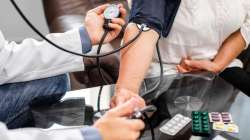Low Blood Pressure: Here are some warning symptoms you should know
There are several factors that can contribute to low blood pressure, including dehydration, blood loss, and certain medications. It's crucial to consult your healthcare provider if you're exhibiting signs of low blood pressure.

When the pressure exerted by blood on the walls of arteries is insufficient, it results in a condition referred to as low blood pressure, or hypotension. While many people may associate high blood pressure with negative health outcomes, low blood pressure can also have serious consequences if left untreated. It's important to be aware of the symptoms of low blood pressure so that you can take appropriate action if you experience them.
Dizziness or lightheadedness: You may feel as though you are about to faint or that the room is spinning around you. This can be especially noticeable when you stand up quickly after sitting or lying down for an extended period of time. You may also experience blurred vision or a feeling of tunnel vision.
Fatigue or weakness: You may feel as though you don't have the energy to complete normal activities, or you may feel as though your muscles are weak or heavy. You may also experience shortness of breath or difficulty breathing, especially during physical activity.
Nausea or vomiting: In some cases, low blood pressure can cause nausea or vomiting. You may also experience cold, clammy skin or a feeling of sweating even when you are not exerting yourself. If your blood pressure is extremely low, you may experience confusion or even loss of consciousness.
Sleepiness: Sleepiness is a common symptom of low blood pressure, as the brain may not be receiving enough oxygen and nutrients due to reduced blood flow. This can result in feelings of fatigue and drowsiness, which can be alleviated by addressing the underlying cause of low blood pressure.
Low blood pressure may not always require medical intervention, it can be a sign of an underlying medical condition that needs to be addressed. Your healthcare provider can perform a physical exam and run diagnostic tests to determine the cause of your low blood pressure.